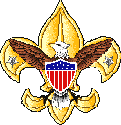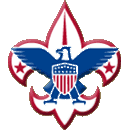| MERIT BADGES |
|
|
|
|
| Note: Eagle Required are in Italics |
"A"
American
Business
American Culture
American Heritage
American Labor
Animal Science
Archaeology
Archery
Architecture
Art
Astronomy
Athletics
Atomic Energy
Auto Mechanics
Aviation
"B"
Backpacking
Basketry
Bird Study
Bugling
"C"
Camping
Canoeing
Chemistry
Cinematography
Citizenship
Community*
Citizenship Nation*
Citizenship World*
Climbing
Coin Collecting
Collections
Communications*
Computers
Cooking
Crime Prevention
Cycling*
"D"
Dentistry
Disability Awareness
Dog Care
Drafting
"E"
Electricity
Electronics
Emergency
Preparedness**
Energy
Engineering
Entrepreneurship
Environmental
Science*
"F"
Family Life*
Farm Mechanics
Fingerprinting
Fire Safety
First Aid*
Fish & Wildlife Mgmt.
Fishing
Fly Fishing
Forestry
"G"
Gardening
Genealogy
Geology
Golf
Graphic Arts
"H"
Hiking
Home Repairs
Horsemanship
"I"
Indian Lore
Insect Studies
"J"
Journalism
"K"
"L"
Landscape Architecture
Law
Leatherwork
Lifesaving**
"M"
Mammal Study
Medicine
Metalwork
Model Design & Building
Motorboating
Music
"N"
Nature
"O"
Oceanography
Orienteering
"P"
Painting
Personal Fitness**
Personal Management*
Pets
Photography
Pioneering
Plant Science
Plumbing
Pottery
Public Health
Public Speaking
Pulp and Paper
"Q"
"R"
Radio
Railroading
Reading
Reptile & Amphibian Study
Rifle Shooting
Rowing
"S"
Safety
Salesmanship
Scholarship
Sculpture
Shotgun Shooting
Skating
Skiing
Small Boat Sailing
Soil & Water
Conservation
Space Exploration
Sports**
Stamp Collecting
Surveying
Swimming**
"T"
Textile
Theatre
Traffic Safety
Truck Transportation
"U"
"V"
Veterinary Medicine
"W"
Water Skiing
Weather
Whitewater
Wilderness Survival
Wood Carving
Woodwork
"X"
"Y"
"Z"
 Drafting DraftingRequirements 1993 |
- Format four sheets of drawing paper (or two sheets of paper if you are completing
requirement 3) with proper borders and title blocks for your projects.
- Make a rough sketch of your project drawings to determine the correct size of paper to format.
- Using single-stroke vertical or slant Gothic lettering, fill in all important information in the title block sections of the formatted paper.
Complete requirement 2 or 3 for your drawing projects.
- Prepare two of the following pencil drawings for reproduction, using two of the
formatted sheets of paper and being sure to fill in the title block information.
- Architectural: Make a rough sketch of a room. From it, make a finished scale floor plan. Using conventional symbols, show all openings, equipment, lights, and safety devices. Use an architectural scale size.
- Mechanical: Make a scale drawing of some piece of craft work or interesting object. Use the orthographic projection technique to show at least three views. Use dimension lines to show the actual size.
- Electrical: Draw a simple schematic of a radio or electronic circuit. Properly print a bill of materials of the major electronic parts of the radio or circuit. Use standard drawing symbols for the electronic components.
- Using a CAD (computer-aided drafting) system, prepare and plot one of the drawings in requirements 2a, 2b, or 2c. Create the format (border and title block) on the computer before starting the drawing.
- Using a formatted sheet of paper, prepare an isometric drawing of something not drawn in requirement 2 or 3. On the drawing, list which instruments you used.
- Lettering: Using single-stroke vertical or slant Gothic lettering, describe in forty words or less why CAD is used in a particular industry (aerospace, electronics, architectural, or other). Use the 8½-by-11-inch formatted sheet.
- Describe the three most common methods of reproducing pencil drawings. Describe one method of reproducing a computer drawing. Make copies of one of your drawings using one of these methods.
|
||||||
Last Update May 15, 2023

.jpg)
